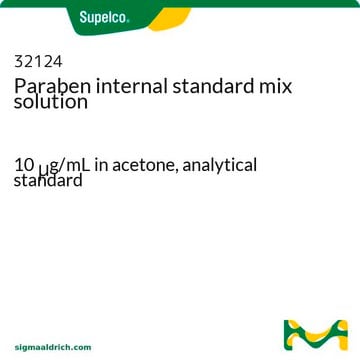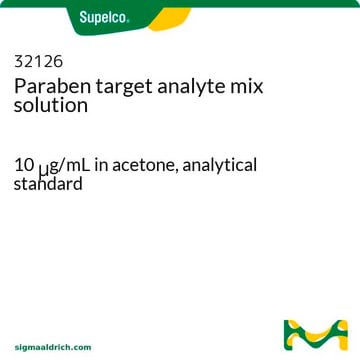47889
Methyl Paraben
PESTANAL®, analytical standard
Synonym(s):
Methyl 4-hydroxybenzoate, p-Hydroxybenzoic acid methyl ester, Methyl paraben, NIPAGIN
About This Item
Recommended Products
grade
analytical standard
product line
PESTANAL®
CofA
current certificate can be downloaded
packaging
ampule of 1000 mg
technique(s)
HPLC: suitable
gas chromatography (GC): suitable
mp
125-128 °C (lit.)
application(s)
cleaning products
cosmetics
food and beverages
personal care
format
neat
storage temp.
2-30°C
SMILES string
COC(=O)c1ccc(O)cc1
InChI
1S/C8H8O3/c1-11-8(10)6-2-4-7(9)5-3-6/h2-5,9H,1H3
InChI key
LXCFILQKKLGQFO-UHFFFAOYSA-N
Gene Information
rat ... Ar(24208)
Looking for similar products? Visit Product Comparison Guide
General description
Application
Recommended products
Legal Information
Hazard Statements
Precautionary Statements
Hazard Classifications
Aquatic Chronic 2
Storage Class Code
11 - Combustible Solids
WGK
WGK 1
Flash Point(F)
334.4 °F
Flash Point(C)
168 °C
Personal Protective Equipment
Choose from one of the most recent versions:
Already Own This Product?
Find documentation for the products that you have recently purchased in the Document Library.
Customers Also Viewed
Our team of scientists has experience in all areas of research including Life Science, Material Science, Chemical Synthesis, Chromatography, Analytical and many others.
Contact Technical Service







